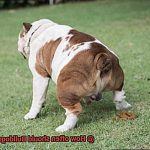How often should Bulldogs poop?
Bulldogs are more than just pets; they’re loyal friends and cherished members of the family. With their adorable snorts, wrinkly faces, and laid-back attitudes, it’s no wonder why these furry friends have captured the hearts of so many. But as a responsible owner, it’s important to keep an eye on your Bulldog’s potty habits to ensure they’re healthy and happy.
One of the most common questions Bulldog owners ask is: How often should Bulldogs poop? Well, the answer isn’t as simple as you might think. A Bulldog’s digestive system is influenced by various factors such as age, diet, and activity level. Puppies have smaller bladders and faster bowel movements compared to adult Bulldogs. And ignoring changes in their pooping frequency could lead to constipation, bowel obstruction or other serious health issues.
That’s where we come in. In this blog post, we’ll delve deeper into the topic of how often Bulldogs poop. We’ll explore what constitutes healthy pooping habits for your furry friend, discuss signs that indicate something may be off with their digestive system, and provide tips on how to establish a consistent routine for your Bulldog’s potty training.
So whether you’re a seasoned owner or new to the world of Bulldogs, join us as we navigate through the ins and outs of BullDog poop together.
How Often Should Adult Bulldogs Poop?
Contents
Typically, adult Bulldogs poop around 1-2 times per day. However, this number can fluctuate depending on various factors.
One of the most significant factors affecting bowel movements is diet. If your Bulldog consumes a high-fiber diet, they may have more frequent bowel movements. Fiber helps keep the digestive system moving and healthy. Conversely, a low-fiber diet may result in less frequent bowel movements. Therefore, it’s essential to provide your Bulldog with a balanced and nutritious diet that meets their dietary needs.
Exercise is another critical factor to consider when it comes to regulating bowel movements. Regular exercise helps maintain a healthy digestive system and promotes regular bowel movements. If your Bulldog isn’t getting enough exercise, they may have irregular bowel movements. So, make sure to take your furry friend for daily walks and playtime to keep them active and healthy.
It’s vital to pay attention to your Bulldog’s stool consistency as well. Normal stool should be firm but not too hard or too soft and should be brown in color. Consistently hard or difficult-to-pass stool could indicate constipation, which may require changes to their diet or medication prescribed by a veterinarian.
Factors That Affect a Bulldog’s Pooping Habits

However, there are several factors that can affect a bulldog’s pooping habits, including diet, exercise, stress, and individualized habits.
When it comes to diet, feeding your bulldog high-quality, nutrient-dense foods can significantly impact their digestive health. Bulldogs that consume low-quality, filler-filled diets may experience irregular bowel movements. Additionally, feeding your bulldog at consistent times of day can help regulate their digestive system and ensure more predictable pooping habits.
Exercise is crucial for maintaining healthy digestion in bulldogs. Regular physical activity can stimulate the colon and promote more frequent bowel movements. On the other hand, bulldogs that are sedentary or do not get enough exercise may experience constipation or irregular bowel movements.
Stress and anxiety can also impact a bulldog’s pooping habits. If your bulldog is experiencing stress or anxiety, they may exhibit signs such as excessive panting or pacing, which could be affecting their pooping habits. Identifying and addressing the root cause of your bulldog’s stress is important for promoting healthy digestion.
It’s important to remember that every bulldog is unique and may have individualized pooping habits. Some bulldogs may poop several times per day, while others may only go once every couple of days. As long as your bulldog appears healthy and is not experiencing any discomfort or distress, there is likely no cause for concern. However, if you notice any significant changes in your bulldog’s pooping habits, it’s crucial to consult with a veterinarian to rule out any underlying health issues.
Puppy Pooping Habits
Puppies tend to do their business more frequently than adult dogs, so it’s crucial to establish a regular feeding and potty schedule to avoid any accidents.
A healthy bulldog puppy usually poops around two to four times a day, but this can vary depending on their age, diet, and activity level. Any sudden changes or irregularities in their bowel movements could indicate an underlying health issue. So, as a responsible pet owner, it’s essential to pay close attention to your pup’s bathroom routine and seek veterinary attention if necessary.
Housebreaking your puppy can be a challenging process, and accidents may happen inside your home. However, with patience and consistent training, your furry friend will learn where to go potty and what behaviors are expected of them.
Signs of an Underlying Health Issue
Changes in their poop can be an early indication of an underlying health issue. As a devoted pet owner, you want to ensure that your furry friend is healthy and happy, and keeping an eye on their poop can help you achieve just that.
So what should you look out for? Let’s start with constipation. If your Bulldog is having difficulty passing stool or is not pooping regularly, it could be due to a blockage in their colon or rectum. This can be caused by various factors, including dehydration, lack of exercise, or even something stuck in their digestive tract. You may also notice signs of constipation such as straining during bowel movements or passing small, hard stools.
On the other hand, diarrhea can also be a sign of an underlying health issue. If your Bulldog has frequent loose stools or diarrhea that lasts for more than a day, it’s important to seek veterinary attention as soon as possible. Diarrhea can be caused by various factors such as bacterial or viral infections, parasites, food allergies, or even stress.
Perhaps the most alarming sign is blood in your Bulldog’s poop. This could indicate various health issues such as colitis, rectal ulcers, or even cancer. If you notice any blood in your Bulldog’s stool, it’s crucial to take them to the vet immediately for diagnosis and treatment.
Monitoring the Consistency and Color of Your Bulldog’s Stool
That’s why it’s important to monitor the consistency and color of their stool. While every dog is different, keeping an eye on your Bulldog’s bowel movements can provide valuable insight into their overall well-being.
Your Bulldog should ideally be pooping at least once a day. If they seem to be straining or not pooping regularly, it could be a sign of constipation or other underlying health issues. On the other hand, if they are experiencing diarrhea or pooping excessively, it could indicate digestive problems or food intolerances.
Consistency and color are crucial factors to monitor. A healthy Bulldog’s stool should be firm and well-formed with a consistent brown color throughout. If you notice any abnormalities such as blood, mucus, or unusual colors, it is important to consult with your veterinarian right away. These could indicate serious health issues such as rectal ulcers or cancer.
It’s also essential to pay attention to any changes in your Bulldog’s behavior or appetite. If they seem lethargic or uninterested in food, it could be a sign of digestive issues or other health problems that require immediate attention.
7ZwNQfXPhQ4″ >
Conclusion
In conclusion, keeping a close eye on your Bulldog’s pooping habits is essential for maintaining their digestive health. While there’s no universal answer to how often Bulldogs should poop, various factors such as diet, exercise, and stress can impact their bowel movements.
Typically, adult Bulldogs will poop 1-2 times per day, while puppies may go more frequently. To avoid accidents in your home, establishing a consistent feeding and potty schedule for your puppy is crucial. Additionally, monitoring the consistency and color of your Bulldog’s stool can provide vital information about their overall well-being.
If you notice any significant changes in your Bulldog’s pooping habits or behavior, seek veterinary attention immediately. Changes in frequency or abnormalities in consistency or color could be early indications of underlying health issues such as constipation, diarrhea, or even cancer.
To maintain healthy digestion and promote regular bowel movements for your furry friend, it’s essential to feed them a balanced and nutritious diet while providing regular exercise.




